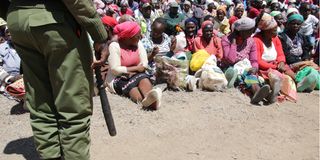Appeal for return of offtake scheme as drought kills animals

Residents of Solio Settlement Scheme in Laikipia County wait for relief food from Mrs Dorcas Gachagua, the spouse of Deputy President Rigathi Gachagua, on October 24, 2022. Local pastoralists have appealed for return of livestock off-take programme following ravaging drought.
Drought-stricken pastoralists in Laikipia County have appealed to the national government to revive the livestock offtake programme so as to save the few remaining cattle from imminent death.
Under the scheme, animals were purchased from local herders, slaughtered and the meat distributed as relief food to locals. It was suspended last month when money allocated to it by the National Treasury ran out.
Some 1,097 animals had been slaughtered in six wards in the county and Sh7 million spent when the programme ended.
One cow, which sold for Sh15,000, would be slaughtered and the meat shared among 10 families, while a goat or a sheep cost Sh3,000 and the meat was distributed to four families.
But the programme ended in early September, with the national government now distributing livestock fodder in the form of range cubes (pellets) to cushion pastoralists from the negative effects of the ravaging drought.
“As we speak, no additional funds have been allocated by the national government to support the livestock offtake programme which was being coordinated by the Kenya Red Cross,” said Golicha Guyo, the Laikipia coordinator for the National Drought Management Authority.
“However, this week we commenced distribution of some 1,120 bags [of 50Kg each] of range cubes to livestock farmers.”
The fodder had been ferried to Sossian ward in Kirima sub-county and Segera, Mukogodo East and Mukogodo West wards in Laikipia North, he said.
Mukogodo East Ward Representative Paul Leshuel hailed the government’s efforts but called the fodder distribution a drop in the ocean.
“It is true that about 250 bags of animal feeds will be distributed in my ward. But if you divide this with a population of 5,000 herders, with each having several cows and goats, you will realise this intervention, no matter how good-intentioned, is unsustainable,” Mr Leshuel said.
He lamented that many children were also out of school because they were sent home over non-payment of fees while others were starving and education had ceased to be a priority.
Selling animals through the offtake programme, he said, would help parents return their children to school.
“The food-for-school programme launched by Governor Joshua Irungu last week is yet to reach the ground. I think there is a lengthy procurement process on the foods, something that is slowing what is supposed to be an emergency intervention,” Mr Leshuel said.
Launching the Sh20 million food-for-school programme, Governor Irungu said no learner should be sent home for lack of school fees and asked school administrators to use food donations as fees for needy students.
Some 183,000 people are relying on food aid because of the drought and thousands of cattle have succumbed since the beginning of the year.
Mr Guyo said the drought affects rural and urban residents.
“Cases of malnutrition have been noted in both rural and urban areas affecting children aged below five,” he said, adding that prices of cereals had shot up in less than two weeks, with a kilo of maize rising from Sh80 to Sh90.
The value of livestock in the markets had also dropped.
He added that over 80 percent of water sources in Laikipia had dried up and several boreholes were no longer functional, damaged by overuse.





